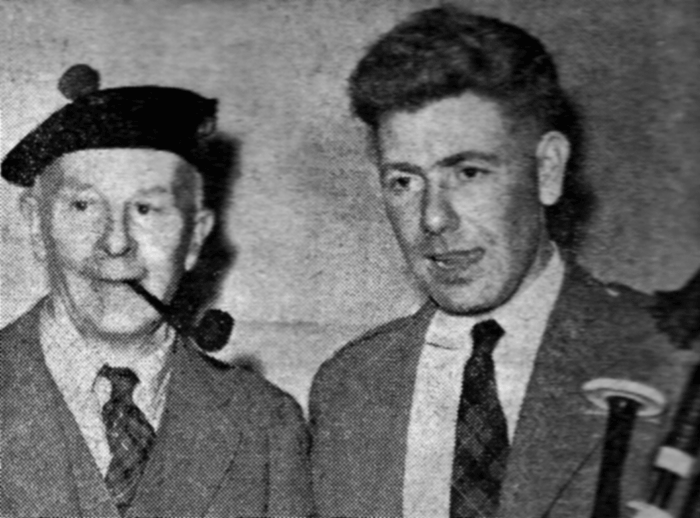
This is the second part a letter, a copy of which Donald held in his papers. It was from Seton Gordon, is dated January 5, 1973, and was to Col. John McEwing, a piping enthusiast in the US and the man responsible for so much good work in the Pacific North West. He was the original director of the Coeur d’Alene Piping School in Idaho where Donald taught. Seton Gordon (known as Satan Gordon to some competing pipers) was a renowned piping judge, writer and naturalist. A friend of royalty, he was a prominent piping figure and wrote on the bagpipe for The Times newspaper. This excerpt from his letter to Col. McEwing makes mention of Bob Brown, Balmoral. He is pictured above left with Donald at the Uist & Barra competition in Glasgow in the 1960s.
I would say among present day pipers John MacFadyen and Donald MacPherson are the best. Both can play a tune that is clear in the mind for years afterwards.
There are many fine players, and we must not forget my old and valued friend Bob Brown who I would put first from the end of the Second World War to his sudden passing from this earthly scene.
I had the good fortune to put Bob Brown in touch with John MacDonald. I went to judge at the Braemar Games. King George V had a deep love for ceòl mòr and used to ask me at Braemar Games how Brown played; he did not then know J MacDonald.
[wds id=”2″]
It was, I think, in 1927 that the King said, ‘How did Brown play?’
I said ‘Very well, sir, but I wonder if you could send him to John MacDonald, the greatest of all pipers, next winter.’
He said, ‘I can’t spare him; he trapped 3,000 rabbits for me last winter!’
I said (the King was very homely and easy to talk to), ‘He would be better employed if he were sent to John MacDonald.’
The King smiled, thought a little, then said firmly, ‘You are perfectly right.’
So Bob Brown, and Bob Nicol too, had two winters tuition with John MacDonald. I think that I was thus able to do something beyond price for another perfect gentleman, and renowned piper, Robert Urquhart Brown.
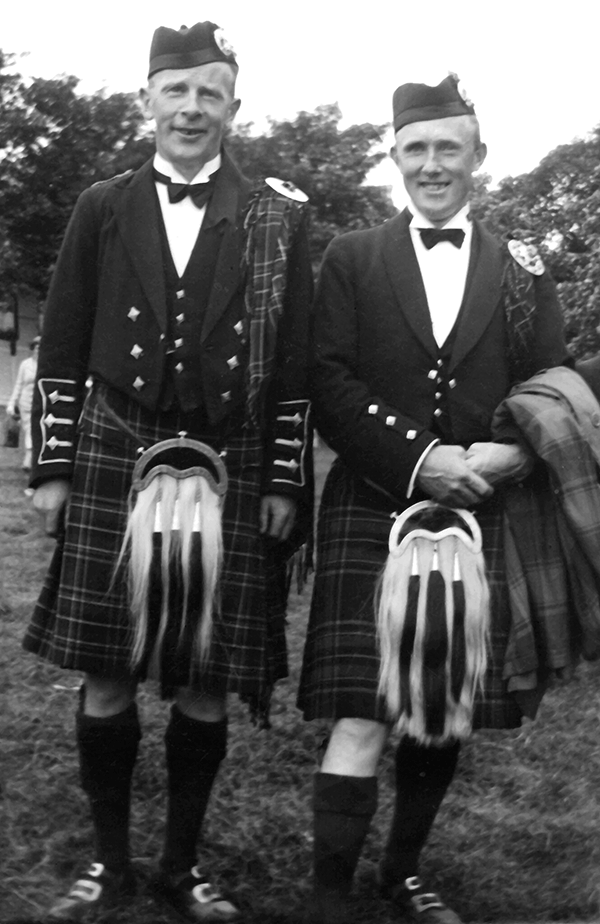
The King made Brown and Nicol go to all the big gatherings, paid their expenses, and, after they returned, made them play to him the tunes they had played at, say, Oban or the Northern Meeting. He used to sit on the stairs, his terrier by his side, and listen intently as the hours passed.
What a picture a great artist could have painted of the scene – perhaps even now someone could paint it from photographs. Think hiow unique it could be if it was carefully portrayed. I had indeed not thought of this until I was writing this letter.
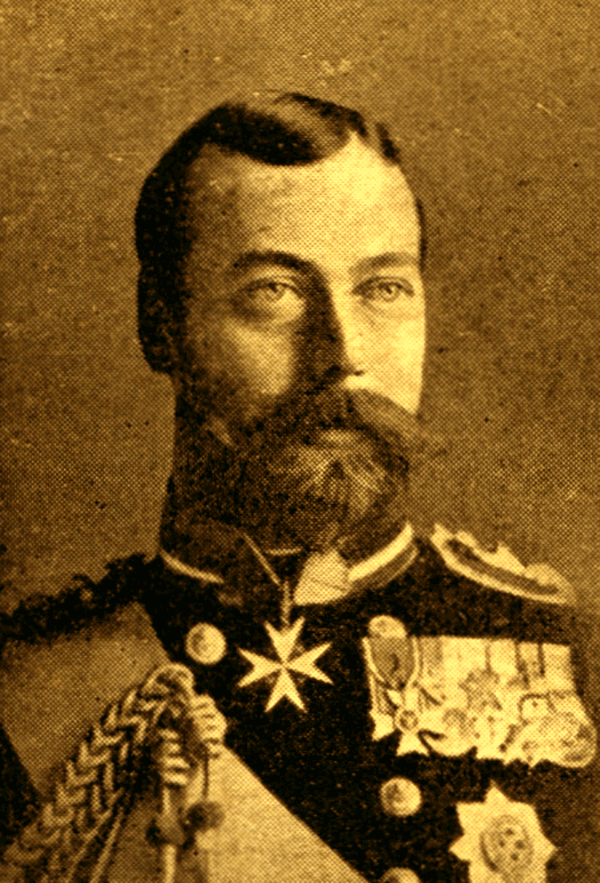
John MacDonald thought that ceòl mòr was ending its life with the Second World War, and indeed it was at a LOW ebb in 1945.
John MacDonald was very poorly then and I think the last amateur he taught was Donald MacGillivray, Calrossie. [Donald MacGillivray won the Gold Medal in 1948 playing the Lament for Donald Duaghal MacKay and it is said that he handed back the prizemoney in order to retain his amateur status.]
He also for a time during the war coached P/M Donald MacLeod of the Seaforths. I heard Donald play ‘The Kiss of the King’s Hand’ at Percival Road [J McD’s home in Inverness] about 1942 and he was first class.
J McD was afraid the Army Class at Edinburgh Castle might not improve him; he [Donald] was about to go there.
I could go on writing, and if someone could take down my memories as they occur a long essay might result.
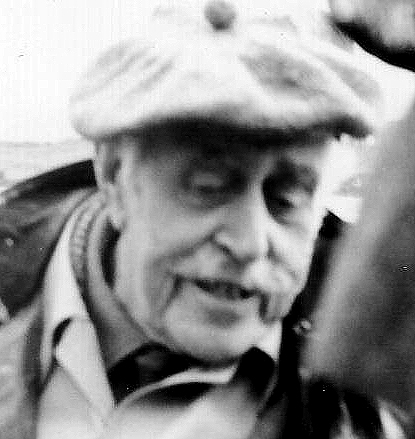
I remember being on the boat from Mallaig to Portree with J McD. A Skyeman was taking the remains of his son from the Mainland to Skye. During the voyage we entered into conversation with the sorrowful father.
John MacDonald took his piob mhor from its box and as we sailed north through the strong tides he played, as he alone could play, ‘Cumha na Cloine’ [Lament for the Children]. Few could have had such an honour.
Yes, I know Clachan. My eldest daugher Catriona is the wife of MacDonald of Lairgie’s younger brother, Major Simon MacDonald-Lockhart of Lee.
I hope this letter will interest you. Seton Gordon.
-
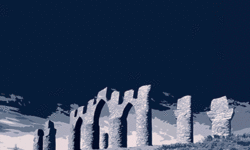 The Fyrish Collection, a digital pipe music book by Niall Matheson£12.00
The Fyrish Collection, a digital pipe music book by Niall Matheson£12.00 -
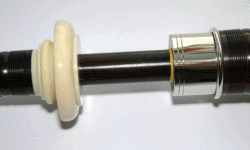 Bagpipes – DN1, High Quality InstrumentPrice range: £100.00 through £1,250.00
Bagpipes – DN1, High Quality InstrumentPrice range: £100.00 through £1,250.00 -
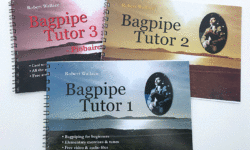 Tutor Books 1-3 in Eng./ Ger.: 60 lessons£35.50
Tutor Books 1-3 in Eng./ Ger.: 60 lessons£35.50















What a wonderful recording of this history. Oh to have witnessed that rendition of Lament for the Children’!
Both R.U. Brown, MBE and R. B. Nicol did their best to carry on the strong traditions of piobaireachd through many of their pupils. Their pupils’ tutelage, in turn, has spread to so many countries.
It is good to learn that our King back then was a genuine lover of ceol mor and, I suspect, he was spoiled in a good way, by hearing this music from bagpipes of exquisite tone
Perhaps in 2022 when the piping world returns to “normalcy'” the Piping Press can hold a celebratory contest as it did for the lock down challenge. The immensely talented artists could if they wish take up the ” [Seton] Gordon challenge;” creating a picture of the good king George V in rapt attention as Bob Brown envelopes the room in that “glorious effect” of piobaireachd.
I am most pleased to read the story ending that letter. Unforgettable.
How crucial was that Royal patronage?!